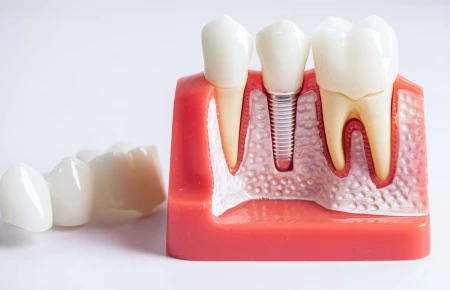How Long Do Dental Implants Last? Maintenance Tips for a Lifetime of Smiles

Understanding Dental Implants
Picture your jawbone like fertile soil: if you plant a seed with strong roots, you get a stable, flourishing tree. Dental implants are akin to that sturdy root system. Their titanium composition integrates with the jawbone in a process called osseointegration, making them incredibly resilient. Studies suggest that well-cared-for implants can last anywhere from 10 to 20 years, and in many cases, even longer.
Factors That Influence Implant Longevity
Just as a healthy plant needs the right environment, your dental implants thrive under optimal conditions:
- Quality of the Procedure
Proper placement by a skilled professional lays the foundation for success.
An implant dentist near me who uses cutting-edge imaging and techniques can significantly improve outcomes.
- Oral Hygiene Practices
Daily brushing, flossing, and rinsing help keep harmful bacteria at bay.
Specialized tools—such as interdental brushes or water flossers—are especially useful around implants.
- Lifestyle Choices
Smoking, high-sugar diets, or excessive alcohol consumption can jeopardize the healing process and stability of your implant.
Wearing a mouthguard if you grind your teeth (bruxism) protects implants from undue stress.
- Overall Health
Certain medical conditions (e.g., diabetes or autoimmune disorders) can affect bone density and healing.
Staying on top of both dental and medical checkups can help you address issues before they escalate.
Maintenance Tips for a Lifetime of Smiles
Keeping your implants in top shape isn’t rocket science, but it does require consistency:
- Brush Thoroughly: Use a soft-bristle toothbrush and gentle circular motions, paying special attention to the gumline around your implant.
- Floss or Use Interdental Cleaners: Plaque can accumulate in tight spaces. Make sure to clear out any hidden debris.
- Schedule Regular Checkups: Seeing your dentist twice a year helps detect and solve potential problems early.
- Mind Your Diet: Crunchy and sticky foods may strain your implant. While occasional treats are fine, focus on a balanced diet rich in vitamins and minerals.
- Watch for Warning Signs: Redness, discomfort, or swelling around the implant site are signals to seek professional help.
Common Misconceptions About Dental Implants
- “Dental Implants Only Last a Few Years.”
In reality, they can often last decades with proper care.
- “Implant Surgery Is Always Painful.”
Modern sedation techniques and advanced procedures make it far more comfortable than many expect.
- “I’m Too Old for Implants.”
Age is less critical than gum and bone health. Many seniors enjoy successful implant treatments.
Frequently Asked Questions (FAQ)
- How do I know if I’m a good candidate for dental implants?
Candidates typically have a healthy jawbone, no active periodontal disease, and are committed to proper oral hygiene. A qualified dentist will assess these factors. Will my insurance cover dental implants? - Coverage varies widely. Some plans offer partial reimbursement, while others may not cover implants at all. It’s best to check with your insurance provider or inquire about financing options.
- What’s the recovery time after implant surgery?
Most patients resume normal activities within a day or two, but full osseointegration (implant bonding to bone) can take several months. - Can smoking affect my dental implants?
Smoking reduces blood flow and slows healing, which heightens the risk of complications. Quitting or reducing smoking significantly improves implant success. - What if I notice pain or swelling around my implant?
Don’t ignore persistent discomfort. Pain, swelling, or redness could indicate an infection or implant issue. Schedule an appointment with your dentist promptly.
A radiant smile stands as a testament to confidence, health, and well-being. With the right care and consistent support from a trustworthy implant dentist near me, your dental implants can serve you faithfully for many years—even a lifetime. After all, investing in your oral health means investing in yourself. By following diligent hygiene habits, making wise lifestyle choices, and keeping up with regular dental visits, you’ll be well on your way to a grin that stands the test of time.






